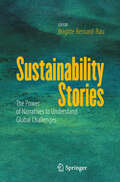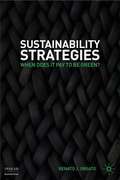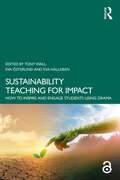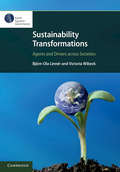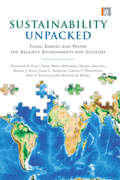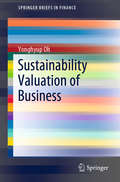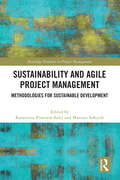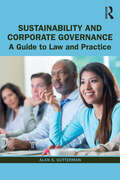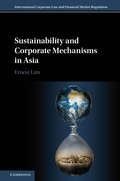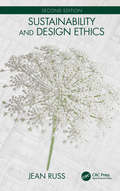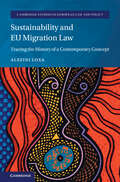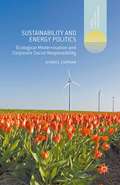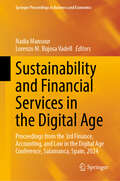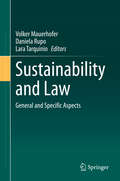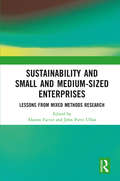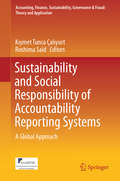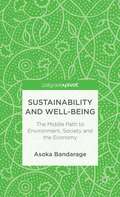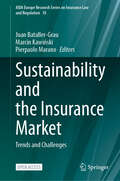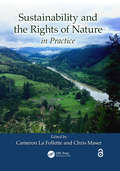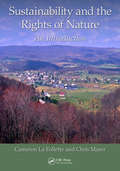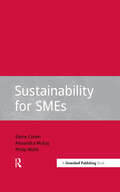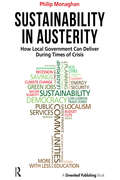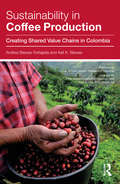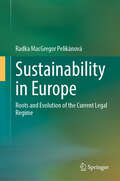- Table View
- List View
Sustainability Stories: The Power of Narratives to Understand Global Challenges
by Brigitte Bernard-Rau"Sustainability Stories" is an impactful book that offers a global perspective on the grand theme of sustainability. Through the lens of practitioners deeply committed to this cause, the book amplifies sometimes unheard voices, inspiring readers from diverse backgrounds to embrace environmental, social, and financial responsibilities. Each contributor, whether an entrepreneur, professor, lawyer, artist, or sustainability expert, acts as a visionary communicator, forging connections and leading by example. Featuring over 30 narratives from countries such as France, Germany, India, Morocco, Spain, Switzerland, and the United States, "Sustainability Stories" is sure to engage an international audience. Through its pages, this book spreads optimism, determination, and a desire for positive societal change. It empowers readers of all ages and educational backgrounds to join the movement toward a sustainable future. By sharing unique insights and experiences, "Sustainability Stories" serves as a catalyst, inspiring individuals to take action and make a difference in their professional practices, communities and lives.
Sustainability Strategies
by Renato J. OrsatoThe request on managers to base eco-investments on solid grounds has never been so vital. They need to know what they should do first, and why. Should they focus on generating carbon credits via eco-efficiencies? Enhance corporate reputation by joining Green Clubs? Subscribe to eco-label programs? Explore emerging cleantech markets? Within the overwhelming possibilities, many spend precious resources without sound criteria. By analyzing the rationales for sustainability strategies, this book addresses a timely question for managers, academics and MBAs: “when does it pay to be green?” Based on solid theoretical foundations and empirical research, it clarifies the elements involved in the formation and evaluation of sustainability strategies in firms, helping managers to prioritize eco-investments and transform them into sources of competitive advantage and new market spaces. Sustainability Strategies delves particularly deep into the troublesome global auto industry. By identifying the roots of economic and environmental problems of the sector, the book shows how to develop Sustainable Value Innovation: the creation of differential value for customers and contribution to society at both, reduced costs and environmental impacts.
Sustainability Teaching for Impact: How to Inspire and Engage Students Using Drama
by Tony Wall Eva Österlind Eva HallgrenSustainability Teaching for Impact is an essential step-by-step, practical guide for those wanting to inspire and engage higher education students in the areas of sustainability.This book encourages new and experienced university teachers across disciplines to adopt and adapt dramatic methods, with a view to develop their teaching. It introduces applied drama and performance arts methods that have been tried-and-tested across disciplines to deepen and broaden sustainability knowledge, skills, mindsets, and practices. Sustainability Teaching for Impact assumes no previous experience of the methods, as university teachers – with and without experience in drama – carefully walk you through some of the teaching practices they have used to create an impact in their teaching.This book is for higher and further education tutors who wish to build on their experience and deliver exciting and accessible classroom techniques and practices that are highly interactive, creative, and engaging to help further the teaching of sustainability.The Open Access version of this book, available at www.taylorfrancis.com, has been made available under a Creative Commons Creative Commons Attribution (CC-BY) 4.0 license.
Sustainability Transformations: Agents and Drivers across Societies
by Björn-Ola Linnér Victoria WibeckSocietal transformations are needed across the globe in light of pressing environmental issues. This need to transform is increasingly acknowledged in policy, planning, academic debate, and media, whether it is to achieve decarbonization, resilience, national development plans, or sustainability objectives. This volume provides the first comprehensive comparison of how sustainability transformations are understood across societies. It contains historical analogies and concrete examples from around the world to show how societal transformations could achieve the Paris Agreement and the United Nations Sustainable Development Goals through governance, innovations, lifestyle changes, education and new narratives. It examines how societal actors in different geographical, political and cultural contexts understand the agents and drivers of societal change towards sustainability, using data from the academic literature, international news media, lay people's focus groups across five continents, and international politics. This is a valuable resource for academics and policymakers working in environmental governance and sustainability.
Sustainability Unpacked: Food, Energy and Water for Resilient Environments and Societies
by Toral Patel-Weynand Kristiina Vogt Maura Shelton Daniel J Vogt John C. Gordon Cal Mukumoto Asep. S. Suntana Patricia A. RoadsFood, water and energy form some of the basic elements of sustainability considerations. This ground-breaking book examines and decodes these elements, exploring how a range of countries make decisions regarding their energy and bio-resource consumption and procurement. The authors consider how these choices impact not only the societies and environments of those countries, but the world in general. To achieve this, the authors review the merits of various sustainability and environmental metrics, and then apply these to 34 countries that are ranked low, medium or high on the human development index. The book assesses their resource capacities and the environmental impacts, both within and outside their country boundaries, from consuming food, water, and energy. The final section uses the lessons derived from the earlier analyses of resource consumption to explore the importance of geography, climates and sustainable management of forests and other natural resources for building resilient societies in the future.
Sustainability Valuation of Business (SpringerBriefs in Finance)
by Yonghyup OhThis book discusses the concept of sustainability valuation, a method in which corporate social responsibility (CSR) among other factors is embedded in the cash value of a given firm. It proposes a new, holistic way of representing sustainability in a theoretical framework, and discusses the role of policy in determining a firm’s cash value. Moreover, it addresses the method’s potential, the challenges involved in its practical application, and how it can be adapted to specific cases. By shaking up the field of firm valuation in an era characterized by global sustainable development, the book makes a valuable contribution to the available literature on finance, sustainability science, and policymaking.
Sustainability and Agile Project Management: Methodologies for Sustainable Development (ISSN)
by Mariusz Sołtysik Katarzyna Piwowar-SulejSustainable project management is a new school of management thought and a growing trend yet there is a scarcity of research on the linkage between individual PM methodologies and sustainability in projects. This book fills a gap through the theoretical and empirical research on the implications of sustainability in project management and, in particular, agile project management.The book explores three main themes. Firstly, it identifies and assesses the validity of the application of the concepts of sustainable development in the family of agile methodological frameworks. Secondly, the research results are presented as an introduction to further in-depth research on the future relationships between sustainable development and agile project management. Thirdly, the book identifies the competencies that are needed to successful implement projects in the context of sustainable development.Sustainability and Agile Project Management will be of direct appeal to academics and scholars in the management sciences, including project management, corporate governance and human resource management.
Sustainability and Corporate Governance: A Guide to Law and Practice
by Alan S. GuttermanSustainability and Corporate Governance is the first extensive and targeted guide for directors and their legal advisors on creating a governance framework for corporations that integrates all the recognized principles of sustainability now being discussed in boardrooms all over the world. The book provides a step-by-step approach on integrating sustainability principles into the activities of the board of directors including detailed guidance on legal, regulatory and business aspects of organizing and operating board committees and designing the sustainability management unit. Essential topics covered include: • Elements of an effective framework for implementation of sustainability governance, including required policies, procedures and committee charters • Organization of the governing board to effectively address sustainability issues and implement sustainability strategies • Best practices and processes to engage company stakeholders Corporate board members and attorneys will appreciate the book’s practical forms and checklists, complete coverage of all facets of sustainability governance, summaries of relevant international and national guidelines and instruments, and a curated list of samples and case studies from companies all around the world.
Sustainability and Corporate Mechanisms in Asia (International Corporate Law and Financial Market Regulation)
by Ernest LimThis is the first book to provide a comparative and critical analysis of why and how six corporate mechanisms - (1) sustainability reporting; (2) board gender diversity; (3) constituency directors; (4) stewardship codes; (5) directors' duty to act in the company's best interests; and (6) liability on companies, shareholders and directors - have been or can be used to promote sustainability in the four leading common law jurisdictions in Asia (Singapore, Hong Kong, India and Malaysia). A central challenge is, whether and if so, how the corporate mechanisms should be reconceptualised to promote sustainability in an environment that is characterised by controlling shareholders, particularly the government in state-owned enterprises. Because controlling shareholders are the norm for the majority of the world's companies, and state-owned enterprises play a significant role, this book has important insights on the problems and prospects of advancing sustainability in concentrated and mixed ownership jurisdictions.
Sustainability and Design Ethics
by Jean Russ<p>Sustainability as a concept remains just as challenging and important today as it was when the first edition of this book was published. The Second Edition of Sustainability and Design Ethics explores the ethical obligations of knowledgeable people such as design professionals, taking into consideration the numerous changes that have taken place in recent years. This book expands the growing discussion on the principles of sustainability to further include the role of businesses and governments and considers the general recognition that modern society has occurred at the expense of nature with significant social and environmental impacts. <p>Are there limits to the individual’s ethical obligation? How do such obligations change or adapt to a world of sustainable design? As the shift toward sustainability proceeds, designers’ ethical underpinnings will be confronted with a wider range of people and concerns whose interests must be weighed. The design professionals are likely to be among the lead in the shift toward sustainability because of the special knowledge and expertise provided to them by their education, experience, and distinctive position in society. The entire world of design is being reassessed and the guiding principles and ethics of design reflect this change. <p>New to the Second Edition: <p> <li>Expanded international scope that includes a comparison of professional organizations in the EU, Australia, Canada, Japan and China <li>Discusses how cultural differences between the West and China result in different underlying foundations for professional ethics <li>Revised analyses to reflect changes in regulatory and technical areas such as the inevitable rise of artificial intelligence in design <li>Updated arguments reflecting the need for sustainability and the designer's role and obligations <li>Updated references pertaining to the progress of sustainable design and development</li> <p>Sustainability and Design Ethics, Second Edition is an attempt to explore the ideas and principles that might contribute to the thinking of thoughtful design professionals. The emergence of "green" design discussed in this book is used to evidence progress, but also to demonstrate the degree to which more is needed.</p>
Sustainability and EU Migration Law: Tracing the History of a Contemporary Concept (Cambridge Studies in European Law and Policy)
by Alezini LoxaSustainable migration is the new objective of the EU migration policy. But what does this mean in terms of legal design? What instruments should be put in place to achieve it? And most importantly what does it imply for migrants' rights? While sustainability has attracted scholarly attention in law and politics already since the 1990s, sustainable migration is an extremely understudied topic with no conclusive research carried on the matter. The book covers a unique scholarly gap by being the first ever contribution that traces the history of sustainable migration in EU law, demonstrates its limitations and potentials and puts forward concrete proposals on how EU migration law should develop in the future. This title is also available as open access on Cambridge Core.
Sustainability and Energy Politics: Ecological Modernisation and Corporate Social Responsibility (Energy, Climate and the Environment)
by Giorel CurranThe author explores the fraught politics of energy transitions in an age of climate change. She does so through an ecological modernisation and corporate social responsibility lens which she contends shapes and underpins sustainability today. Case studies cover climate policy, unconventional gas and renewable energy.
Sustainability and Energy Politics: The Promises of Ecological Modernisation and Corporate Social Responsibility (Energy, Climate and the Environment)
by Giorel CurranSustainability and Energy Politics.
Sustainability and Financial Services in the Digital Age: Proceedings from the 3rd Finance, Accounting, and Law in the Digital Age Conference, Salamanca, Spain, 2024 (Springer Proceedings in Business and Economics)
by Nadia Mansour Lorenzo M. Bujosa VadellThis volume examines how innovation and digital transformation impact the financial and accounting sectors. Featuring selected contributions from the third ‘Finance, Accounting and Law in the Digital Age conference 2024’ held at the University of Salamanca, Spain, the contributions of this book explore the development of digital finance and the complicated equation between financial stability, the security of investors and financial consumers, sustainable finance, and support for innovation. Climate change and the exponential growth of technology have built an explosion of financial innovation. The digital revolution has recently reached the financial sector, protected by a specific regulatory environment. The volume describes how all areas of finance are now invested by new players who are transforming the banking and financial landscape to create a novel digital ecosystem.
Sustainability and Law: General and Specific Aspects
by Volker Mauerhofer Daniela Rupo Lara TarquinioThe book discusses sustainability and law in a multifaceted way. Together, sustainability and law are an emerging challenge for research and science. This volume contributes through an interdisciplinary concept to its further exploration. The contributions explore this exciting domain with innovative ideas and replicable approaches. It combines a variety of authors, from both the public and the private sectors, and thereby guarantees a broad view that enshrines the more theoretical arguments from the academic side as well as stronger practical applicable perspectives. The book provides space for thoughtful expansions of established theories as well as the hopeful emergence of innovative ideas. Moreover, the combination of three to five contributions into the eleven parts respectively aims toward a compression of like minded thoughts. This should lead to an intensification of exchange of viewpoints from different angles on a similar theme. Readers therefore also have the opportunity to concentrate on single chapters, but receive comprised knowledge and a variety of thoughts for new ideas on a particular theme.
Sustainability and Small and Medium-sized Enterprises: Lessons from Mixed Methods Research
by Aharon FactorIndustrialisation has brought great benefits to humankind but now, after 200 years of fossil fuel use, land clearance and pollution, the planet’s boundaries are being stretched to their limits. Going beyond these confines would have severe consequences for humankind. To prevent this from happening, government, corporate and community initiatives must focus on reducing the environmental impact of approximately 400 million small and medium-sized enterprises (SMEs), given that they produce approximately 70% of the world’s pollution, 60% of carbon emissions and have a significant impact on land. To date, research shows that SMEs have been environmental laggards and more needs to be understood to improve sustainability in the SME sector. Broadening the researcher’s methodological focus, beyond traditional singular approaches, improves knowledge generation and better informs policy and practice. This book paves the way by showing the reader that a mixed method research design is able to provide a deep, diverse and holistic understanding of sustainability and SMEs. Importantly, the book also provides an in-depth mapping of mixed method sustainability and SME research at a regional level. As this book is about environmental sustainability framed in a business context, it will be of interest to researchers, academics, students and those in industry who are enquiring about the environmental sustainability of SMEs.
Sustainability and Social Responsibility of Accountability Reporting Systems: A Global Approach (Accounting, Finance, Sustainability, Governance & Fraud: Theory and Application)
by Roshima Said Kıymet Tunca ÇalıyurtThis book explores sustainability and social responsibility from the point of view of accountability reporting systems. The contributions to this volume open up discussions about the theory and application of sustainability and social responsibility across various corporate sectors and assists the reader in applying sustainable corporate social responsibility reporting across those sectors. As a central theme, the book addresses how the theory and application in sustainability and social responsibility has different dimensions and aspects which are impossible to apply across different sectors. This point of view is supported by chapter contributions from countries around the world including Turkey, Serbia, Malaysia, United States, South Africa, Italy, China, Brasil, Romania, Serbia, Puerta Rico, Algeria. Academics worldwide will discover in Sustainability and Social Responsibility of Accountability Reporting Systems: A Global Approach the latest developments about corporate social responsibility and sustainability of accountability reporting systems.
Sustainability and Well-Being: The Middle Path to Environment, Society, and the Economy
by Asoka BandarageA powerful social science analysis and a compassionate philosophical perspective to face the twin challenges of environmental sustainability and human well-being.
Sustainability and the Insurance Market: Trends and Challenges (AIDA Europe Research Series on Insurance Law and Regulation #10)
by Pierpaolo Marano Juan Bataller-Grau Marcin KawińskiThis open access book focuses on the regulatory framework for the sustainability of the insurance market. It analyzes its potential impact on insurance undertakings governance and product design. The book is structured into three parts. It firstly explores the general framework on the sustainability for the insurance market, focusing on the regulation at the European Union level. Secondly, it examines sustainability and insurers' governance, including topics like sustainable investments and ESG factors. Finally, the book turns to sustainability and insurance products, addressing agricultural insurance systems and pensions. The book is aimed at academics, policymakers, and professionals in the insurance sector.
Sustainability and the Rights of Nature in Practise (Social Environmental Sustainability)
by Chris Maser Cameron La FolletteSustainability and the Rights of Nature in Practice is the much-needed complementary volume to Sustainability and the Rights of Nature: An Introduction (CRC Press, May 2017). The first book laid out the international precursors for the Rights of Nature doctrine and described the changes required to create a Rights of Nature framework that supports Nature in a sustainable relationship rather than as an exploited resource. This follow-up work provides practitioners from diverse cultures around the world an opportunity to describe their own projects, successes, and challenges in moving toward a legal personhood for Nature. It includes contributions from Nepal, New Zealand, Canadian Native American cultures, Kiribati, the United States and Scotland, amongst others, by practitioners working on projects that can be integrated into a Rights of Nature framework. The authors also tackle required changes to shift the paradigm, such as thinking of Nature in a sacred manner, reorienting Nature’s rights and human rights, the conceptualization of restoration, and the removal of large-scale energy infrastructure. Curated by experts in the field, this expansive collection of papers will prove invaluable to a wide array of policymakers and administrators, environmental advocates and conservation groups, tribal land managers, and communities seeking to create or maintain a sustainable relationship with Nature. Features: Addresses existing projects that are successfully implementing a Rights of Nature legal framework, including the difference it makes in practice Presents the voices of practitioners not often recognized who are working in innovative ways towards sustainability and the need to grant a voice to Nature in human decision-making Explores new ideas from the insights of a diverse range of cultures on how to grant legal personhood to Nature, restrain damaging human activity, create true sustainability, and glimpse how a Rights of Nature paradigm can work in different societies Details the potential pitfalls to Rights of Nature governance and land use decisions from people doing the work, as well as their solutions Discusses the basic human needs for shelter, food, and community in entirely new ways: in relationship with Nature, rather than in conquest of it
Sustainability and the Rights of Nature: An Introduction (Social Environmental Sustainability)
by Chris Maser Cameron La FolletteSustainability and the Rights of Nature: An Introduction is a much-needed guide that addresses the exciting and significant paradigm shift to the Rights of Nature, as it is occurring both in the United States and internationally in the fields of environmental law and environmental sustainability. This shift advocates building a relationship of integrity and reciprocity with the planet by placing Nature in the forefront of our rights-based legal systems. The authors discuss means of achieving this by laying out Nature’s Laws of Reciprocity and providing a roadmap of the strategies and directions needed to create a Rights of Nature-oriented legal system that will shape and maintain human activities in an environmentally sustainable manner. This work is enriched with an array of unique and relevant points of reference such as the feudal notions of obligation, principles of traditional indigenous cultivation, the Pope Francis Encyclical on the environment, and the new Rights of Nature-based legal systems of Ecuador and Bolivia that can serve as prototypes for the United States and other countries around the world to help ensure a future of environmental sustainability for all living systems.
Sustainability for SMEs: Competitive Advantage Through Transparency (Doshorts Ser.)
by Philip Wolfe Elaine Cohen Alexandra McKaySustainability for SMEs offers a comprehensive introduction to the key business cases and techniques for putting sustainability at the heart of your business strategy.Small businesses make a significant collective impact on the environment and society – but only a tiny percentage of SMEs complete a sustainability report. Sustainability Reporting for SMEs will enable any SME to get up to speed on sustainability reporting and plot a course of action for their business. Elaine Cohen distils the latest and best thinking on sustainability reporting for SMEs, and offers a process for reporting that will deliver significant business advantage, both in terms of more effective internal processes and in terms of reputation, customer loyalty and business-building.In many SMEs sustainability is one person’s passion and responsibility. A large part of their job becomes selling sustainability to other people in the business. Strategic Sustainability offers arguments, information and tactics that will help that person get the buy-in they need to move sustainability forward in their business. Sustainability is of strategic importance to a business. This book makes an airtight case for why action is essential and how sustainability can help a business not only survive but thrive in competitive marketplaces.The major environmental impact of most businesses derives from energy usage. There are many ways to make your organisation's energy usage more sustainable. In Sustainable Energy Options for Business, Philip Wolfe outlines the best available options for (1) reducing energy use and (2) improving the sustainability of energy supply. After an introduction to regulatory drivers and management issues, Wolfe looks at energy opportunities in five key areas.
Sustainability in Austerity: How Local Government Can Deliver During Times of Crisis
by Philip MonaghanAs the economic crisis of 2008/09 unfolded, it became apparent that the huge mountains of debt being built up by central governments were unsustainable and that savage cuts would be needed to balance budgets. It also became clear that the public sector would be one of the first in line when the axe started swinging. Yet, at the very same time, green advocates from business, academia and civil society were making calls for greater investment at the local level in the big sustainability issues of the day such as fostering sustainable consumption or educating communities on making the transition to a low-carbon economy. The upshot is that leaders in local government are going to be asked to do a lot more work on environmental and social sustainability but with much less money. To make matters worse, increasing public scepticism about why we should deal with these dilemmas in the first place has been exacerbating the problem, notably exemplified by concerns over the robustness of the science of climate change. Local sustainability faces a perfect storm. Sustainability in Austerity has been written to provide local leaders with a lifebelt in these turbulent times. It empowers local authorities to address the challenges they now face – by offering a treasure chest of cost-neutral and powerful ways for leaders in local government to advance sustainability as nations emerge from the global recession. The book sets out the required rules for leadership and proposes a myriad of innovative strategies for self-help achieved through habit-forming behaviour change among council members, staff and local communities alike. Packed with international case studies, anecdotes and management tips derived from a wealth of learning by like-minded peers across the world – all of whom have faced and overcome serious sustainability challenges – the book will be a touchstone for professionals working in areas such as: democracy and decision-making; corporate assets and resources; economic development and planning; waste and environmental services; fleet and logistics; and community management. There is an impressive array of books that provide fresh and innovative thinking on sustainability, but the vast majority have ignored or overlooked inspirational stories of positive change in local government. Sustainability in Austerity is a game-changing book and will be essential reading for managers and councillors in local government across the world, in either emerging or developed economies; managers in central government; community organisation leaders; academics; and management consultants who work with this sector on policy and performance.
Sustainability in Coffee Production: Creating Shared Value Chains in Colombia
by Asit K. Biswas Andrea Biswas-TortajadaCoffee, as a commodity and through its global value chains, is the focus of much interest to achieve fair trade and equitable outcomes for producers, processors and consumers. It has iconic cultural and economic significance for Colombia, which is one of the world's major coffee producers for the global market. This book examines sustainable coffee production in Colombia, specifically the initiatives of Nestlé to create shared value. It describes the transformation of the coffee landscape by the development of economically, socially and environmentally viable and dedicated supply chains. Suppliers have been encouraged to shift production and quality paradigms, in order to develop long-term and sustainable strategies for higher value and premium quality products. This has been partially achieved by establishing a robust partnership with the Coffee Growers Federation and other public, private and social actors, thereby taking control of the institutional architecture and knowledge base that exists in the country. The book provides an important lesson of corporate social responsibility and the creation of shared value for the benefit of farmers, corporations and consumers.
Sustainability in Europe: Roots and Evolution of the Current Legal Regime
by Radka MacGregor PelikánováThis book analyses the roots and evolution of the concept of sustainability in Europe and the European Union. As sustainability has always mirrored certain value judgments on justice and priorities, it is suitable for functionalist, analytical, contextual and historical comparisons via multidisciplinary studies combining various branches of the social sciences, law, philosophy, and economics. The aim of this book is to explore the roots and evolution of sustainability, so as to reveal how a European style of sustainability has emerged, one that is inextricably linked to our civilization and history. It identifies linear and cyclical phases with clear trends toward expanding the reach of sustainability, its subjects and their duties. The book offers a multidisciplinary, chronological and contextual overview of the evolution of sustainability until the 21st century, while also addressing its legal regime. Sustainability has many faces and needs to be approached in a dynamic manner through the lens of sustainable development or via a multi-stakeholder model that includes private subjects and corporate social responsibility. Although primarily intended for an audience with an advanced background in law, economics and philosophy, the book will also benefit a more general audience, particularly those who want to learn where the current sustainability concerns and legal regime actually came from.
